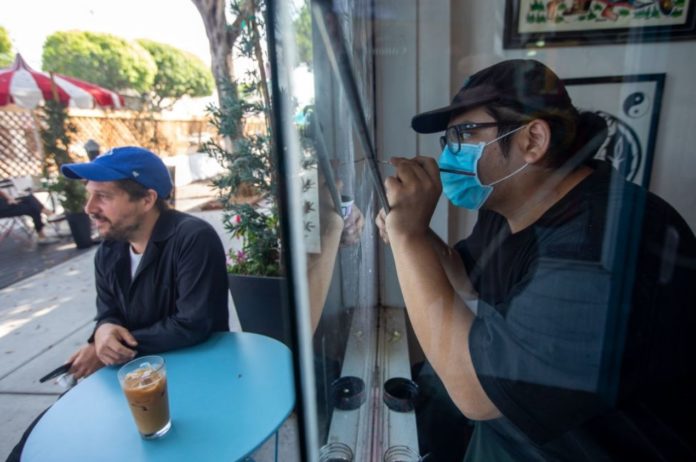According to major research that has tested almost all of a small Italian town,:
- 20% people can infect up to 79% of population
- Antibodies remain high for nine months
- Re-infection can boost the immune system
The research paper, published in the journal Nature Communications, focused on the town of Vo which became the centre of the country’s coronavirus pandemic in February 2020 when it recorded Italy’s first death.
- Does This Mean We Stopped Being Animal and Started Being Human Due to ‘Copy Paste’ Errors?
- The One Lifestyle Choice That Could Reduce Your Heart Disease Risk By More Than 22%
- Aging: This Is What Happens Inside Your Body Right After Exercise
- Immune-Boosting Drink that Mimics Fasting to Reduce Fat – Scientists ‘Were Surprised’ By New Findings
- Gun Violence in America: What They Don’t Talk About at the Debate
Researchers from the University of Padua and Imperial College London have already tested antibodies against COVID-19 in over 85% of the town’s 3,000 inhabitants.
The results of the study showed that 98.8 percent of individuals who were infected during the pandemic’s initial wave still had detectable antibody levels nine months later, regardless of whether their illness was symptomatic or not.
Residents’ antibody levels were determined using three distinct “assays,” or procedures that identified distinct types of antibodies directed against distinct components of the virus.
The findings indicated that all antibody levels decreased when the body recovered from infection, although the rate of drop varied according to the assay used.
Additionally, the researchers discovered many instances of individuals’ antibody levels increasing, indicating that possible viral re-infections boosted the immune system.
Dr Ilaria Dorigatti of Imperial College London stated:
We found no evidence that antibody levels between symptomatic and asymptomatic infections differ significantly, suggesting that the strength of the immune response does not depend on the symptoms and the severity of the infection.
However, our study does show that antibody levels vary, sometimes markedly, depending on the test used. This means that caution is needed when comparing estimates of infection levels in a population obtained in different parts of the world with different tests and at different times
further added by Dr Dorigatti, the lead author of the study.
Additionally, the researchers examined how the illness transmitted to household members and discovered that there was a 25% probability of the virus being transferred in this manner.
Surprisingly, the study also discovered that the vast majority of transmissions, 79%, were generated by 20% infected with the virus.
The large differences in how one infected person may infect others in the population suggests that behavioural factors are key for epidemic control, and physical distancing, as well as limiting the number of contacts and mask wearing, continue to be important to reduce the risk of transmitting the disease, even in highly vaccinated populations
the researchers added.
Another aspect of the study was an analysis of two mass PCR testing campaigns conducted in February and March, as well as the antibody surveys in May and November, which allowed them to analyse the impact of various control measures.
- Does This Mean We Stopped Being Animal and Started Being Human Due to ‘Copy Paste’ Errors?
- The One Lifestyle Choice That Could Reduce Your Heart Disease Risk By More Than 22%
- Aging: This Is What Happens Inside Your Body Right After Exercise
- Immune-Boosting Drink that Mimics Fasting to Reduce Fat – Scientists ‘Were Surprised’ By New Findings
- Gun Violence in America: What They Don’t Talk About at the Debate
This data showed that, in the absence of case isolation and short lockdowns, manual contact tracing alone would not have been enough to suppress the epidemic.
Project lead Professor Andrea Crisanti, from the University of Padua, said:
Our study also shows that manual contact tracing – the search for positive individuals on the basis of known and declared contacts – would have had a limited impact on the containment of the epidemic, had it not been accompanied by a mass screening.
Dr Dorigatti added:
It is clear that the epidemic is not over, neither in Italy nor abroad. Moving forward, I think that it is of fundamental importance to continue administering first and second vaccine doses as well as to strengthen surveillance including contact tracing. Encouraging caution and limiting the risk of acquiring SARS-CoV-2 will continue to be essential.
- Does This Mean We Stopped Being Animal and Started Being Human Due to ‘Copy Paste’ Errors?
- The One Lifestyle Choice That Could Reduce Your Heart Disease Risk By More Than 22%
- Aging: This Is What Happens Inside Your Body Right After Exercise
- Immune-Boosting Drink that Mimics Fasting to Reduce Fat – Scientists ‘Were Surprised’ By New Findings
- Gun Violence in America: What They Don’t Talk About at the Debate
Photo by Francine Orr / Los Angeles Times via Getty Images
